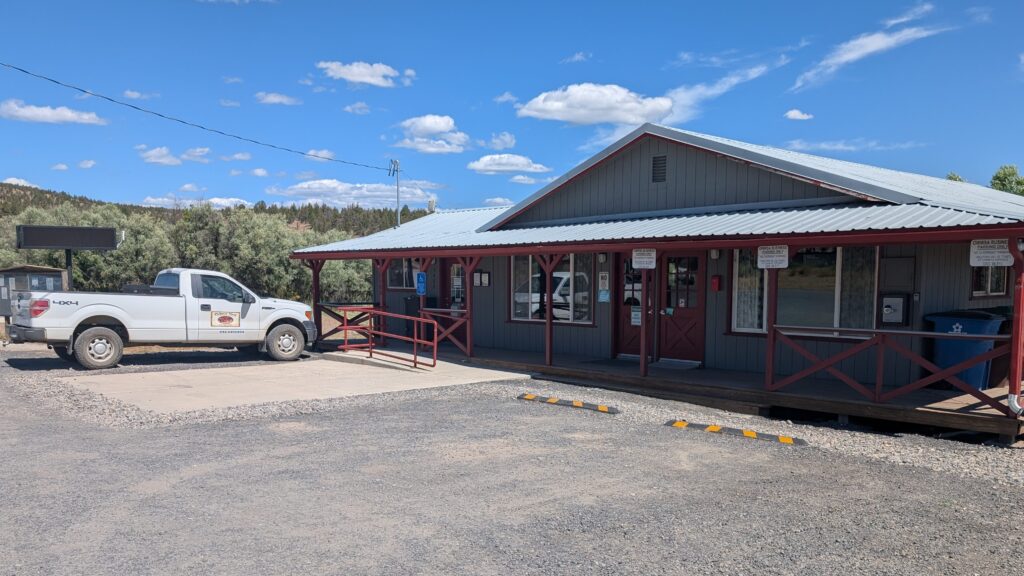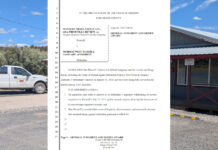
Crook County, Ore. – The Ochoco West Water & Sanitary Authority (OWWSA) is facing intensifying scrutiny after revelations involving both its former and current managers involving ethics and nepotism issues, and its former manager’s alleged misuse of district funds and other controversies that led to his quiet 2024 resignation.
Internal financial documents appear to show that current OWWSA manager Jamie Helms’ spouse, Crystal Helms, has been employed to perform meter-reading part-time for the authority. The arrangement has raised fresh questions of nepotism, potentially implicating Oregon’s ethics laws under ORS Chapter 244, which bar public officials from using their positions to financially benefit family members, including through employment and contracting.
Several other individuals are also reportedly employed part-time for meter-reading, despite the small district already having several employees that it had publicly acknowledged separately from the several individuals it employs for meter reading.
When pressed at OWWSA’s September 30th meeting—already the district’s third attempt to convene after two failed earlier tries—Helms and nearly all board members repeatedly declined to comment on the payments or the spouse’s role and compensation in the district.
Another document provided to the Prineville Review also appears to show a quote from Lindsey Land & Tree, LLC for services with a max bid amount of $1,100 being provided to “Jamie & Crystal Holmes” [sic] in June of 2024, but listed the address for the OWWSA at 5488 NW Prine Rd. Nowhere does the document mention the OWWSA.
Other documents, that are reportedly from the Ochoco West POA, also appear to corroborate recent allegations that Helms, who resides in the district, has used their authority and access with the OWWSA to access POA amenities despite having significant unpaid POA dues, further raising questions on potential misuse of public office.
The slew of documents recently obtained by the Prineville Review were mailed by what appears to be an unknown whistleblower and came following our initial reporting in July and August over community concerns related to the Ochoco West community.
The September 30th meeting was originally set for September 9th, but Helms drew criticism for providing the Prineville Review with late notice on a Saturday, September 6th. While technically more than the minimum 48 hours required under Oregon law, the statute also requires notice to be given “as soon as reasonably possible.” Several sources later confirmed to this publication that other community members received notice days earlier.
The September 9th meeting also failed to include remote access options, despite community members and the Prineville Review repeatedly calling for compliance and the board’s own August vote to ensure web or telephonic access going forward. OWWSA had previously claimed late last year that it was not “reasonable” to provide remote attendance, but minutes later showed multiple board members were themselves being allowed to attend by telephone as early as December of 2024, and on numerous occasions throughout this year, according to its own meeting minutes.
The board attempted again to meet on September 22nd, this time with remote attendance finally set up for the public, albeit with a last-minute change of the access link. But only three members appeared, leaving the body without a quorum and unable to hold the meeting. Board Chair Dan Parks was among those absent, and no official business could be conducted.
Allegations against the former OWWSA manager for personal use of public funds
Meanwhile, controversy lingers over former manager Ray Horton, who resigned last year after accusations that he misused district accounts for personal expenses. The recently disclosed documents reference a third-party investigative report detailing Horton’s alleged purchases.
One of the documents reviewed appears to be an exhibit from the report, showing that Horton used district accounts to purchase a dog crate, gun accessories, work clothes, multiple Applebee’s gift cards, a Gee’s Family Restaurant gift certificate, DMV fees for a personal vehicle, reservation charges through Expedia, and other items. Additional purchases were reportedly made using Horton’s personal funds but processed through the district’s Amazon account, with shipments directed to the OWWSA offices. The document indicates that the alleged DMV charges were repaid a month later with text saying “accidentally used work card”.
The exhibit “B” reflects a total of $2,835.93 in listed expenses that appear to have been attached to the report. Records also show that some transactions were completed on the OWWSA Amazon account but paid with a bank card under the name “Jessica Horton,” with items delivered to the OWWSA offices. Other purchases using OWWSA funds through the Amazon account reportedly show direct shipment to Horton’s residence.
The purchases spanned a period from 2022 through early 2024. The document also appeared to highlight questions with the district’s accounting practices in documenting receipts, even for what may have been legitimate purchases.
Other records obtained also pointed to a history of alleged time theft by Horton that was reportedly investigated by an unknown third party. That prompted our public records request seeking a copy of the full investigative report and its exhibits, a request that has been denied by Helms and which the district’s board declined to intervene on.
According to both current and former district officials, who spoke on condition of anonymity for fear of retribution, Horton was quietly allowed to resign amid the allegations. One of those same sources also claimed that Horton’s timesheets had numerous discrepancies when checked against some security camera footage, but also explained that footage could not help audit a vast amount of timesheets as video storage only lasted for a limited period of time.
Despite repeated questioning, Parks and other board members have also refused to comment on these new revelations involving Horton.
Helms, who is now the district’s new manager, admitted in OWWSA’s response to a subsequent records request from the Prineville Review that the investigative report into Horton exists, but refused to release it, citing Oregon’s conditional exemption statute under ORS 192.345, which provides that records are exempt “unless the public interest requires disclosure in the particular instance.”
The Prineville Review formally challenged this denial directly to the district, arguing that the overwhelming public interest in financial transparency and accountability clearly requires disclosure of the Horton report, but Helms (and not the board) has ignored that response since August. The Prineville Review has not yet submitted a petition seeking review from the Crook County District Attorney after waiting to appeal to the OWWSA Board directly, which was unsuccessful during Tuesday’s meeting.
The same records request also sought emails from Board Chair Dan Parks. Helms responded by claiming Parks had no emails since taking office on July 1st. When asked about the claim, Parks told this publication he would not be providing any such emails, suggesting that any records were from his personal account rather than his official one.
Following the conclusion of Tuesday’s board meeting, we questioned Parks further on the claim that his email account, as Parks had indeed used his OWWSA email in communications with the Prineville Review in August, and it seemed questionable that Parks had not used his official email account except for that single email since taking office.
In one such August 20th email response to this publication’s offer for board members to comment on ongoing district controversies, Parks appeared to imply that elected officials could not respond individually and included all board members in his reply to the Prineville Review: “It is my understanding that individual board members have no authority to speak for the board without a decision of the board. We will need to hold a meeting to discuss our responses to your questions.”
The Prineville Review had made clear in response that it was not seeking collective responses from the board or OWWSA, but rather individual members’ personal positions on governance and ethics issues. Elected officials are free to share individual opinions and positions and are not constrained the same way as non-elected officials often are.
Parks then claimed during our follow-up, following Tuesday’s meeting, that his August 20th email was to caution other board members about speaking with the media. However, we quickly pointed out that his email did not contain any other statements beyond the above-quoted message. That prompted our questions asking if Parks had separately emailed or engaged in other serial communications with the board outside of the meetings since no such message was contained in his August 20th email, but he did not answer and promptly left.
When asked directly if he would release the emails related to OWWSA business after indicating he used his personal email, Parks repeatedly said he had zero intention of doing so. This position runs contrary to well-established public records law in Oregon, where courts and the state Attorney General have repeatedly held that public business conducted on personal email is subject to disclosure. The issue of personal email use by public officials has long been a flashpoint, most notably during the scandals involving former Gov. John Kitzhaber and his fiancée, Cylvia Hayes. In that case, reporter Nick Budnick and The Oregonian successfully fought a challenge to an Oregon Attorney General order on its records petition filed by Hayes, which confirmed that many of Hayes’ personal emails were subject to release under state law.
The district remains in violation of a July 21st records request that the Crook County DA previously ordered released. Helms has ignored multiple follow-ups, and OWWSA failed to file a timely notice and challenge in Crook County Circuit Court within the required seven days. That failure could leave the district liable for attorney fees for both parties should the matter proceed to court, regardless of the outcome.
The Prineville Review confirmed to the OWWSA Board during the September 30 meeting that it has retained legal counsel and that litigation is imminent over the July 21st records request failure should it fail to intervene, and again stressed our desire to avoid legal action. The OWWSA board has not taken up any the records matters during its meetings.
Broader scrutiny over wave of public meeting violations
The nepotism and spending allegations come as OWWSA is now the subject of a preliminary investigation by the Oregon Government Ethics Commission. That probe, confirmed earlier last month, stems from a series of public meetings law violations documented by the Prineville Review over the past year. The OGEC stated that the preliminary process is to determine if there is “cause” for a formal investigation, which it explained was if there is “…a substantial objective basis for believing that an offense or violation may have been committed,”.
The Prineville Review is not aware of whether there is any separate investigation into the ethics questions now uncovered involving Helms.
The OGEC cannot release any information during its preliminary review except to confirm the existence of the preliminary review, according to its statement.
Among them was a July 29th special meeting reportedly convened by Parks with just four hours’ notice—far short of the required public notice under state law. Despite warnings from this publication that the meeting would be unlawful, the board proceeded anyway, although at least one board member further questioned whether they should proceed.
That meeting also resulted in the prompt resignation of its now former legal counsel, Jered Reid. It was later discovered that Reid resigned after the Prineville Review contested the notice, sharing a copy of the meeting notice with Reid prior to the meeting. Within about an hour, Reid emailed the board his notice of withdrawal. That letter was later shared by the board during a subsequent meeting, which confirmed Reid’s resignation was prompted by the illegal July 29th meeting notice that made it clear that Parks was intent on pushing for a change in legal counsel.
Reid had also been in the process of responding to our earlier July 21st public meetings grievance for the board, and his resignation warned the board of their deadline to respond. The Board ultimately failed to meet the 21-day deadline to respond to the public meeting’s grievance, which later prompted the Prineville Review to escalate the grievance to a formal complaint for failing to respond. Responses to public meeting grievances generally do not require a response from an attorney.
The grievances involved numerous allegations of violations throughout June and July, as well as last year. Other likely violations earlier this year were mentioned but not subject to review by the OGEC, as a grievance must be filed within 30 days of the actual violation, not 30 days from the date the violation is discovered. That issue prompted the OGEC and others to push the legislature for a change in the new law during this year’s legislative session, but the changes stalled in committee.
One of the recent internal documents, which was anonymously provided to the Prineville Review, also detailed that the Special District’s Association of Oregon (SDAO) provided training on “Board Practices” as recently as June of 2024. Parks also stated at a recent meeting that during his many years in his past tenure as President, he had repeatedly attended trainings from the SDAO, which included public meetings training.
Following that meeting and subsequent reporting from this publication, the OWWSA Board then initially proposed an agenda item that appeared to involve the potential adoption of a “media screening policy”, but the agenda item was removed in a revised meeting agenda. As with nearly all other inquiries, OWWSA officials have refused to comment.
READ MORE: "Water board targets press with new policy after illegal meeting reports, public records failures"
A financial document also reportedly shows that in June of 2024, the OWWSA paid the Oregon DOJ $200 for copies of the Oregon Attorney General’s Public Records & Meetings Manual. The document is, however, published for free online by the Oregon DOJ, although it does offer pre-printed versions for purchase.
The discovery raises questions about some claims by Parks and other board members in recent months that they were not aware of the State’s public meetings requirements. It also came before this publication’s own discoveries of public meetings violations late last year, as well as the OWWSA’s interaction with the SDAO, which had prompted the board to take action to address identified issues with its practices, issues that appear to have continued well more than a year later. A separate SDAO board practices review document for the OWWSA Board appears to outline concerns listed as “caution” and “danger” concerning board practices and management.
For a recap on our recent series of reporting on the OWWSA, click here.
The Prineville Review was unable to reach Horton for comment in the weeks leading up to publication.
Mr. Alderman is an investigative journalist specializing in government transparency, non-profit accountability, consumer protection, and is a subject matter expert on Oregon’s public records and meetings laws. As a former U.S. Army Military Police Officer, he brings a disciplined investigative approach to his reporting that has frequently exposed ethics violations, financial mismanagement, and transparency failures by public officials and agencies.





